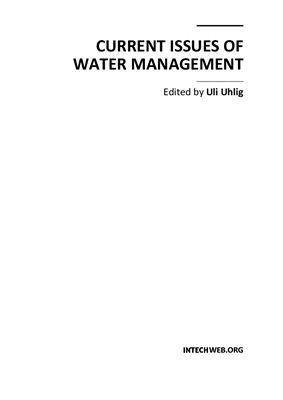InTech. 2011. 352 p.
There is an estimated 1.4 billion km3 of water in the world but only approximately three percent (39 million km3) of it is available as fresh water. Moreover, most of this fresh water is found as ice in the arctic regions, deep groundwater or atmospheric water. Since water is the source of life and essential for all life on the planet, the use of this resource is a highly important issue. "Water management" is the general term used to describe all the activities that manage the optimum use of the world's water resources. However, only a few percent of the fresh water available can be subjected to water management. It is still an enormous amount, but what's unique about water is that unlike other resources, it is irreplaceable. This book provides a general overview of various topics within water management from all over the world. The topics range from politics, current models for water resource management of rivers and reservoirs to issues related to agriculture. Water quality problems, the development of water demand and water pricing are also addressed. The collection of contributions from outstanding scientists and experts provides detailed information about different topics and gives a general overview of the current issues in water management. The book covers a wide range of current issues, reflecting on current problems and demonstrating the complexity of water management.
Contents.
Preface.
Part 1 Water Resource Management for Rivers and Reservoirs.
Generalized Models of River System Development and Management.
Integrated Water Resources Management as a Basis for Sustainable Development – The Case of the Sava River Basin.
Web-Based Decision Support Framework for Water Resources Management at River Basin Scale.
Assessing Environmental and Social Dimensions of Water Issues Through Sustainability Indicators in Arid and Semiarid Zones.
Part 2 Water and Agriculture.
Integration Challenges of Water and Land Reform – A Critical Review of South Africa.
Paddy Water Management for Precision Farming of Rice.
Part 3 Water Quality.
Simulation of Stream Pollutant Transport with Hyporheic Exchange for Water Resources Management.
Wetlands for Water Quality Management – The Science and Technology.
Part 4 Politics, Regulation and Guidelines.
Bringing Water Regulation into the 21st Century: The Implementation of the Water Framework Directive in the Iberian Peninsula.
Public Private Partnerships in the Privatization of Water Service Delivery in Kenya.
From Traditional to Mode Water Management Systems; Reflection on the Evolution of a ‘Water Ethic’ in Semi-Arid Morocco.
Part 5 Water Demand / Water Pricing.
The Willingness to Pay of Industrial Water Users for Reclaimed Water in Taiwan.
Analysis of the Current German Benchmarking Approach and Its Extension with Efficiency Analysis Techniques.
Water Soft Path Analysis – Jordan Case.
Cities and Water – Dilemmas of Collaboration in Los Angeles and New York City.
There is an estimated 1.4 billion km3 of water in the world but only approximately three percent (39 million km3) of it is available as fresh water. Moreover, most of this fresh water is found as ice in the arctic regions, deep groundwater or atmospheric water. Since water is the source of life and essential for all life on the planet, the use of this resource is a highly important issue. "Water management" is the general term used to describe all the activities that manage the optimum use of the world's water resources. However, only a few percent of the fresh water available can be subjected to water management. It is still an enormous amount, but what's unique about water is that unlike other resources, it is irreplaceable. This book provides a general overview of various topics within water management from all over the world. The topics range from politics, current models for water resource management of rivers and reservoirs to issues related to agriculture. Water quality problems, the development of water demand and water pricing are also addressed. The collection of contributions from outstanding scientists and experts provides detailed information about different topics and gives a general overview of the current issues in water management. The book covers a wide range of current issues, reflecting on current problems and demonstrating the complexity of water management.
Contents.
Preface.
Part 1 Water Resource Management for Rivers and Reservoirs.
Generalized Models of River System Development and Management.
Integrated Water Resources Management as a Basis for Sustainable Development – The Case of the Sava River Basin.
Web-Based Decision Support Framework for Water Resources Management at River Basin Scale.
Assessing Environmental and Social Dimensions of Water Issues Through Sustainability Indicators in Arid and Semiarid Zones.
Part 2 Water and Agriculture.
Integration Challenges of Water and Land Reform – A Critical Review of South Africa.
Paddy Water Management for Precision Farming of Rice.
Part 3 Water Quality.
Simulation of Stream Pollutant Transport with Hyporheic Exchange for Water Resources Management.
Wetlands for Water Quality Management – The Science and Technology.
Part 4 Politics, Regulation and Guidelines.
Bringing Water Regulation into the 21st Century: The Implementation of the Water Framework Directive in the Iberian Peninsula.
Public Private Partnerships in the Privatization of Water Service Delivery in Kenya.
From Traditional to Mode Water Management Systems; Reflection on the Evolution of a ‘Water Ethic’ in Semi-Arid Morocco.
Part 5 Water Demand / Water Pricing.
The Willingness to Pay of Industrial Water Users for Reclaimed Water in Taiwan.
Analysis of the Current German Benchmarking Approach and Its Extension with Efficiency Analysis Techniques.
Water Soft Path Analysis – Jordan Case.
Cities and Water – Dilemmas of Collaboration in Los Angeles and New York City.

